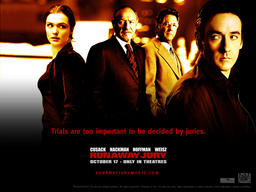Runaway Jury (2003)
 While the setting sets the stage for a high-stakes drama, this
is really a human story: all to do with these characters, who
they are and why they act as they do. The audience has little
indication of what to expect in the beginning and as one might
expect, not all is as it seems in the beginning. Although the
defense's jury consultant is clearly (and annoyingly) intended
to be the villain, Hackman's performance is wonderful, showing
this character to be, through everything, a human being, making
him believable. A less adroit performance could easily have
made Rankin Fitch a hollow stereotype, a caricature.
While the setting sets the stage for a high-stakes drama, this
is really a human story: all to do with these characters, who
they are and why they act as they do. The audience has little
indication of what to expect in the beginning and as one might
expect, not all is as it seems in the beginning. Although the
defense's jury consultant is clearly (and annoyingly) intended
to be the villain, Hackman's performance is wonderful, showing
this character to be, through everything, a human being, making
him believable. A less adroit performance could easily have
made Rankin Fitch a hollow stereotype, a caricature.
Hoffman plays the idealistic Wendell Rohr, an attorney who seeks to stop badness by using the courts to make someone with money liable for it. (I think Rohr misguided, attempting to use the courts to accomplish in the judicial branch of government what really should be done in the legislative and executive branches.) He is fundamentally an honest man, as well as experienced and intelligent. Hoffman and Hackman are quite a pair, playing well off of one another, making the conflict intense and deeply personal: honesty and integrity standing up to money and power.
Nick Easter (Cusack) and Marlee (Weisz) are mysterious in the beginning and only gradually come to light, and only as needed to keep the audience in the story. Cusack is thoroughly believable as a very complex man whose motivations are unclear, but who is certainly up to something. Weisz complements him well, not only in their interactions, but in her role supporting him from behind the scenes. Marlee is strong and tough when she needs to be even though the audience can see that she's terrified and vulnerable. Both Cusack and Weisz wonderfully play characters playing characters. Only in the last minutes of the movie as everything is resolved do their motivations become clear.
Given the setting, one might be inclined to pay close attention to the litigants or the attorneys in the case. In fact, the primary struggle was between Fitch and the shadowy Marlee, who claimed to be able to swing the jury's verdict to the highest bidder. Despite the clear differences between the heroes and villains in the presentation of the film, I was struck with the similarities in the attitudes of each. Both sides had lost faith in the system established to settle disputes according to law—leading them both to game the system in an attempt to obtain a favorable verdict without regard to the rule of law. In such a narrow view justice is warped, defined only by victory.
“Runaway Jury” is a compelling film but despite the intended presentation of a happy ending, I regard the story as a tragedy. Whatever the motivations of the film's “heroes,” the simple fact is that they were corrupting the process just as much as its villains. None of the victims was brought back to life and the promise that future victims would be saved is a hope completely lacking in foundation. Whether a verdict favorable to one's worldview was achieved is not relevant. The system of jurisprudence was simply perverted once again—and that's no happy ending.

